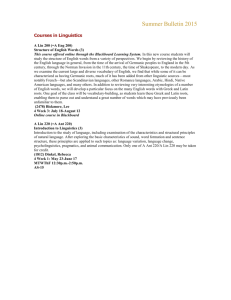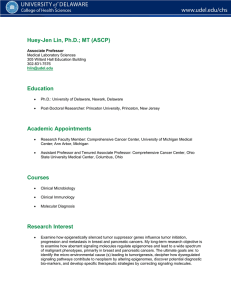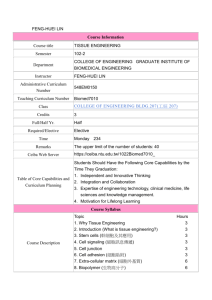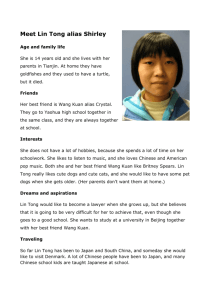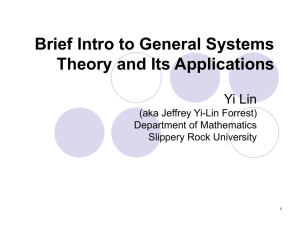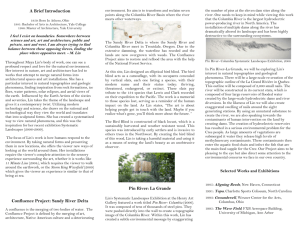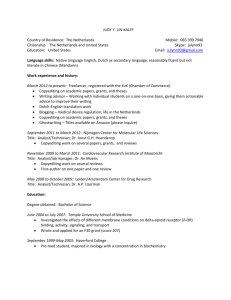Link to CV - University of Delaware
advertisement
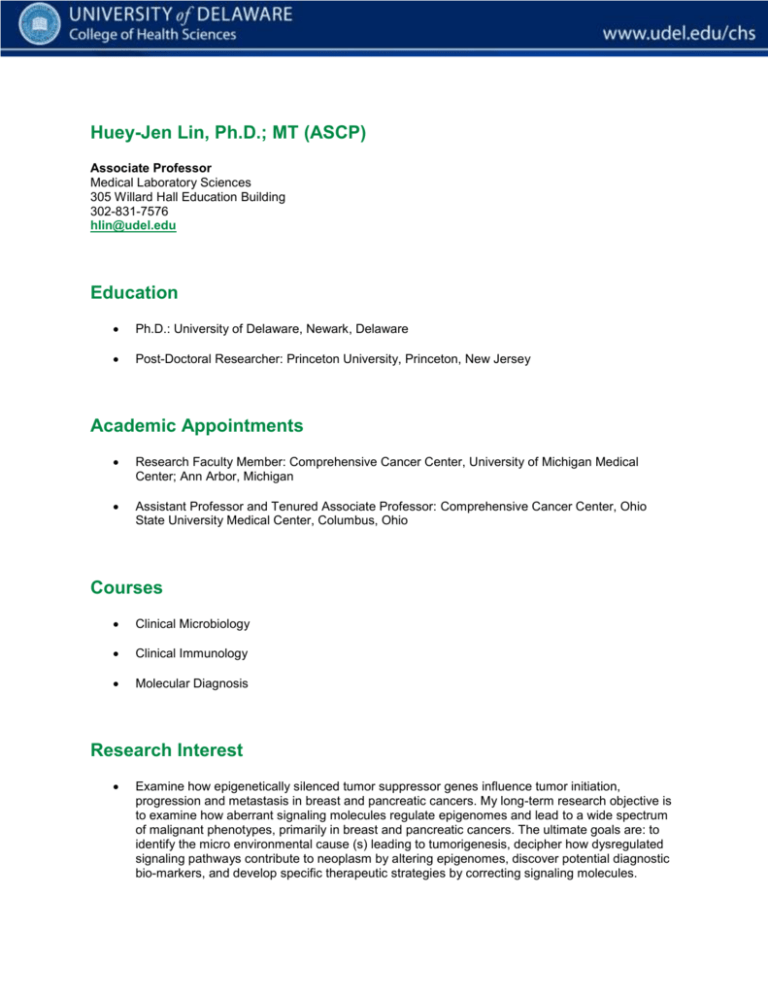
Huey-Jen Lin, Ph.D.; MT (ASCP) Associate Professor Medical Laboratory Sciences 305 Willard Hall Education Building 302-831-7576 hlin@udel.edu Education Ph.D.: University of Delaware, Newark, Delaware Post-Doctoral Researcher: Princeton University, Princeton, New Jersey Academic Appointments Research Faculty Member: Comprehensive Cancer Center, University of Michigan Medical Center; Ann Arbor, Michigan Assistant Professor and Tenured Associate Professor: Comprehensive Cancer Center, Ohio State University Medical Center, Columbus, Ohio Courses Clinical Microbiology Clinical Immunology Molecular Diagnosis Research Interest Examine how epigenetically silenced tumor suppressor genes influence tumor initiation, progression and metastasis in breast and pancreatic cancers. My long-term research objective is to examine how aberrant signaling molecules regulate epigenomes and lead to a wide spectrum of malignant phenotypes, primarily in breast and pancreatic cancers. The ultimate goals are: to identify the micro environmental cause (s) leading to tumorigenesis, decipher how dysregulated signaling pathways contribute to neoplasm by altering epigenomes, discover potential diagnostic bio-markers, and develop specific therapeutic strategies by correcting signaling molecules. Peer-Reviewed Research Publications 1. Wang F-F, Wang Y-J, Lee H-J, Fong J-C. Identification of erythropoietin receptors of erythroleukemic cells. Biochemistry International 18:163-171 (1989). 2. Lin H-J, Upson RH, Simmons DT. Nonspecific DNA binding activity of simian virus 40 large T antigen: evidence for the cooperation of two regions for full activity. Journal of Virology 66:54435452 (1992). 3. Lin H-J., Eviner V., Prendergast GC., White E. Activated H-ras rescues E1A-induced apoptosis and cooperates with E1A to overcome p53-dependent growth arrest. Mol Cell Biol. 15:4536-4544 (1995). PMID: 7623844. 4. Page C, Lin H-J*, Jing Y, Castle VP, Nuñez G, Lin J. Overexpression of Akt/AKT can modulate chemotherapy-induced apoptosis. Anticancer Research 20:407-16 (2000). *First two authors contributed equally to this work. 5. Lin H-J, Flint SJ. Identification of a cellular repressor of transcription of the adenoviral late Iva2 gene that is unaltered in activity in infected cells. Virology 277:397-410 (2000). 6. Lin H-J, Holman P, Lu J, Finniss S, Dickinson C and Castle VP. Functional activity of chimeric molecules containing a death signal against neuroblastoma. Clinical Cancer Research. 5 (11/99 suppl. #427) (2000). 7. Jasty R., van Golen C., Lin H-J., Solomon G., Heidelberger K., Polverini P., Opipari A., Feldman E., Castle VP. Bcl-2 and N-Myc coexpression increases IGF-IR and features of malignant growth in neuroblastoma cell lines. Neoplasia. 3:304-313 (2001). PMID: 11571630 8. Burke W., Jin X., Lin H-J., Huang M., Liu R., Reynolds RK., Lin J. Inhibition of constitutively active Stat3 suppresses growth of human ovarian and breast cancer cells. Oncogene. 20:7925-7934 (2001). PMID: 11753675 9. Lin J., Jin X., Rothman K., Lin H-J., Tang H., and Burke W. Modulation of signal transducer and activator of transcription 3 activates by p53 tumor suppressor in breast cancer cells. Cancer Research. 62:376-380 (2002). PMID: 11809683 10. Bian X., Giordano TD., Lin H-J., Solomon G., Castle VP., Opipari AW. Jr. Chemotherapy-induced apoptosis of S-type neuroblastoma cells requires caspase-9 and is augmented by CD95/Fas stimulation. Journal of Biological Chemistry. 279:4663-4669 (2004). PMID: 14617634 11. Lin H-J.,* Hsieh FC., Song H., and Lin J. Elevated phosphorylation and activation of PDK-1/AKT pathway in human breast cancer. British Journal of Cancer (2005) 93:1372-1381. PMID: 16288304 *First and corresponding author. 12. Cen L., Arnoczky KJ., Hsieh FC., Lin H-J., Qualman SJ., Yu S., Xiang H., and Lin J. Phosphorylation profiles of protein kinases in alveolar and embryonal rhabdomyosarcoma. Modern Pathology, 20:936-946, (2007). PMID: 17585318 13. Cen L., Hsieh FC., Lin H-J., Chen CS., Qualman SJ., and Lin J. PDK-1/AKT pathway as a novel therapeutic target in rhabdomyosarcom cells using OSU-03012 compound. British Journal of Cancer 97, 785-791 (2007). (Nature Publishing Group). PMID: 17848913 14. Chan MW., Huang YW., Hartman-Frey C., Kuo C-T., Deatherage D., Qin H., Cheng AS., Yan PS., Davuluri RV., Huang TH., Nephew KP., and Lin H-J.* Aberrant Transforming Growth Factorbeta 1 Signaling and SMAD4 Nuclear Translocation Confer Epigenetic Repression of ADAM19 in Ovarian Cancer. Neoplasia 10:908-919. (2008). PMID: 18714391 *Corresponding author. 15. Lin H-J.,* Zuo T., Lin C-H., Kuo C-T., Liyanarachchi S., Sun S., Shen R., Deatherage DE., Potter D., Asamoto L., Lin S., Yan PS., Cheng A-L., Ostrowski MC., and Huang TH. Breast cancerassociated fibroblasts confer AKT1-mediated epigenetic silencing of Cystatin M in epithelial cells. Cancer Research 68:10257-10266 (2008). PMID: 19074894 *1st and corresponding author. 16. Chan C, Lin H-J, and Lin J. Stress-associated hormone, norepinephrine, increases proliferation and IL-6 levels of human pancreatic duct epithelial cells and can be inhibited by the dietary agent, sulforaphane. International Journal of Oncology 33:415-419 (2008). 17. Lieblein JC., Ball S., Hutzen B., Sasser AK., Lin H-J., Huang TH., Hall BM., Lin J. STAT3 can be activated through paracrine signaling in breast epithelial cells. BMC Cancer 21;8(1):302 (2008). PMID: 18939993 18. Qin H., Chan MW., Liyanarachchi S., Balch C., Potter D., Souriraj IJ., Cheng AS., Agosto-Perez FJ., Nikonova EV., Yan PS., Lin H-J., Nephew KP., Saltz JH., Showe LC., Huang TH., and Davuluri RV. An Integrative ChIP-chip and Gene Expression Profiling to Model SMAD Regulatory Modules. BMC Systems Biology 3:73 (2009). PMID: 19615063 19. Huang Y-W., Jansen RA., Fabbri E., Potter D., Liyanarachchi S., Chan MW., Liu JC., Crijns AP., Brown R., Nephew KP., van der Zee AG., Cohn DE., Yan PS., Huang TH., Lin H-J.* Identification of candidate epigenetic biomarkers for ovarian cancer detection. Oncology Reports 22:853-861 (2009). PMID: 19724865 *Corresponding author. 20. Chou J-L., Su H-Y., Chen L-Y., Liao YP., Hartman-Frey C., Lai YH., Yang H-W., Deatherage DE., Kuo C-T., Huang YW., Yan PS., Hsiao S-H., Tai CK., Lin H-J., Davuluri RV., Nephew KP., Huang TH., Lai H-C., Chan MW. Promoter hypermethylation of novel tumor suppressor FBXO32 predict survival in ovarian cancer patients. Lab Invest. 90(3):414-425 (2010). PMID: 20065949 21. Pichiorri F, Suh SS, Rocci A, De Luca L, Taccioli C, Santhanam R, Zhou W, Benson DM Jr, Hofmainster C, Alder H, Garofalo M, Di Leva G, Volinia S, Lin H-J., Perrotti D, Kuehl M, Aqeilan RI, Palumbo A, Croce CM. Down-regulation of p53-inducible microRNAs 192, 194 and 215 impairs the p53/MDM2 autoregulatory loop in multiple myeloma development. Cancer Cell 18:367-381 (2010). PMID: 20951946 22. Zuo T, Liu TM, Lan X, Weng YI, Shen R, Gu F, Huang YW, Liyanarachchi S, Deatherage DE, Hsu PY, Taslim C, Ramaswamy B, Shapiro CL, Lin H-J., Cheng AS, Jin VX, Huang TH. Epigenetic Silencing Mediated Through Activated PI3K/AKT Signaling in Breast Cancer. Cancer Research 71(5):1752-1762 (2011). PMID: 21216892. 23. Lin L, Liu A, Peng Z, Lin H-J, Li P-K, Li C, and Lin J. STAT3 is necessary for proliferation and survival in colon cancer-initiating cells. Cancer Research 71(23):7226-7237 (2011). PMID: 21900397. (IF: 8.206). 24. Peng Z, Weber JC, Han Z, Shen R, Zhou W, Scott J, Chan M, and Lin H-J. Dichotomy Effects of Akt/PKB signaling in breast cancer. Molecular Cancer 11:61 (2012). 25. Peng Z, Shen R, Li Y, Teng K-Y, and Lin H-J. Epigenetic Repression of RARRES1 Is Mediated by Methylation of a Critical Proximal Promoter Region Along with a Loss of CTCF Binding (PLoS One. 2012; 7(5): e36891). 26. Lin L, Hutzen B, Lee H-F, Peng Z, Lin H-J, Sun D, Li P-K, Li C, Korkaya H, Wicha M, and Lin J. STAT3 as a novel therapeutic target in human breast cancer initiating cells (submitted in 2012). Book Chapter Publication 1. 1. Alfred S.-L. Cheng, Huey-Jen Lin, and Tim H.-M. Huang. Book Chapter 6: Interrogating Estrogen Receptor a signaling in breast cancer by chromatin immunoprecipitation microArrays. Book Tile: Genomic Endocrinology. Editor: Stuart Handwerger and Bruce J. Aronow. (2008). ISBN: 978-1-58829-651-1. 2. Chan M, Peng Z, Weber JC, Li Y, Zuzolo N, and Lin H. Methods of Global Epigenomic Profiling. Book Title: Toxicoepigenomics. Editor: Saura C. Sahu, Ph.D.; Publisher: John Wiley and Sons Ltd (Published 2012). Peer-Evaluated Review Articles in Journal 1. Huey-Jen Lin*, Tao Zuo, Jennifer R. Chao, Zhengang Peng, Lisa Asamoto, Sonya Yamashita, and Tim H.-M. Huang. Seed in soil, with an epigenetic view. Biochimica et Biophysica Acta. 1790: 920-924 (2009). *1st and corresponding author. ISSN: 0304-419X. 2. Tao Zuo, Benjamin Tycko, Ta-Ming Liu, Huey-Jen Lin and Tim H.-M. Huang. Methods in DNA methylation profiling. Epigenomics 1(2):331-345 (In Press. ISSN 1750-1911; Publisher: Future Medicine). Awarded Research Grants (as the Principal Investigator in a chronological order) Sponsor: American Cancer Society. Project title: Epigenetic influence of breast tumor-associated fibroblasts on normal mammary epithelia Sponsor: US Army, Department of Defense, Idea grant award, Breast cancer research program. Project title: Epigenetic impact of breast tumor microenvironment on normal mammary stem cells. A Novel Approach for Developing Treatment Regimens and Diagnostic Tests. Sponsor: Susan G. Komen for the cure grants program Project title: The epigenetic impact of cancer associated-fibroblasts on breast neoplasm. Sponsor: Interdisciplinary Collaborative Grants, Comprehensive Cancer Center, The Ohio State University Project title: Epigenetic Influence of cancer-associated fibroblasts on pancreatic cancer initiation and progression
